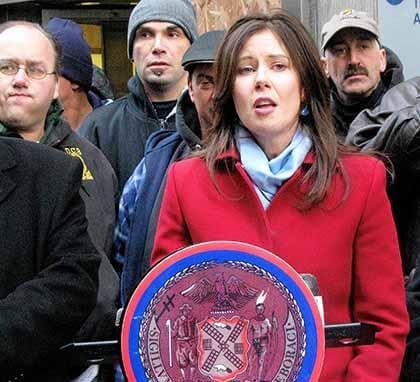By Philip Newman
For the third time in as many years millions of straphangers, commuter train riders and motorists in the New York City metropolitan area will once again pay more for transportation starting Dec. 30.
Metropolitan Transportation Authority Chairman Jay Walder said the agency had no choice considering its financial straits, which have already brought shutdowns of entire subway lines and curtailment of bus service.
The biggest hike is on the one-third of all subway and bus riders who use the 30-day unlimited MetroCard. It will rise from $89 to $104.
The base fare for individual trips on buses, subways and Access-A-Ride stays at $2.25 with seniors paying $1.10.
Single-ride tickets available in vending machines are only $2.50.
The seven-day MetroCard will go to $29. Fares on express buses stay at $5.50 with off-peak fares of $2.75.
Most Long Island Rail Road fares will rise by 7.6 percent to 9.4 percent depending on the type of ticket and how far the passenger travels.
Tolls on MTA bridges and tunnels will rise to $6.50 at most crossings for cash customers and increase by 23 cents to $4.80 at most crossings for E-ZPass users.
Information in greater detail may be obtained online at mta.info.
Although the plight of the MTA is precarious, riders of Long Island Bus face an uncertain future as far as their trips are concerned.
The MTA at its Dec. 15 meeting approved a 2011 budget without any money for Long Island Bus.
The problem is that the MTA has been subsidizing the suburban bus line by tens of millions for years and is loathe to continue the largess.
The MTA told Nassau officials it must have $26 million for the bus line’s share in the operation. Nassau recently voted to provide $9.1 million.
“I think Nassau County has an obligation to fund bus service in Nassau County,” Walder told last week’s MTA meeting.
In a recent communication with Nassau County Executive Edward Mangano, Walder said: “As you know, every county in the MTA region is responsible for financing its local bus operation. While every other county in the region meets its obligation, in recent years the MTA has been forced to provide up to $26 million a year to make up for Nassau County’s shortfall. In essence, this takes taxpayer dollars from across the MTA region to subsidize the bus service in a single county.”
The MTA is required to notify Nassau County 60 days before any decision to end service on the line, which carries 109,000 daily, including many from Queens.
But talks between the MTA and Nassau County are going on.
Mitchell Pally, who represents Suffolk County on the MTA board, said he was optimistic some sort of agreement between Nassau officials and the MTA could be reached. In any case, he said, finances were such that service could continue until spring.
Nassau County has its own problems, with a $343 million deficit expected in 2011.
Reach contributing writer Philip Newman by e-mail at timesledgernews@cnglocal.com or phone at 718-260-4536.


































